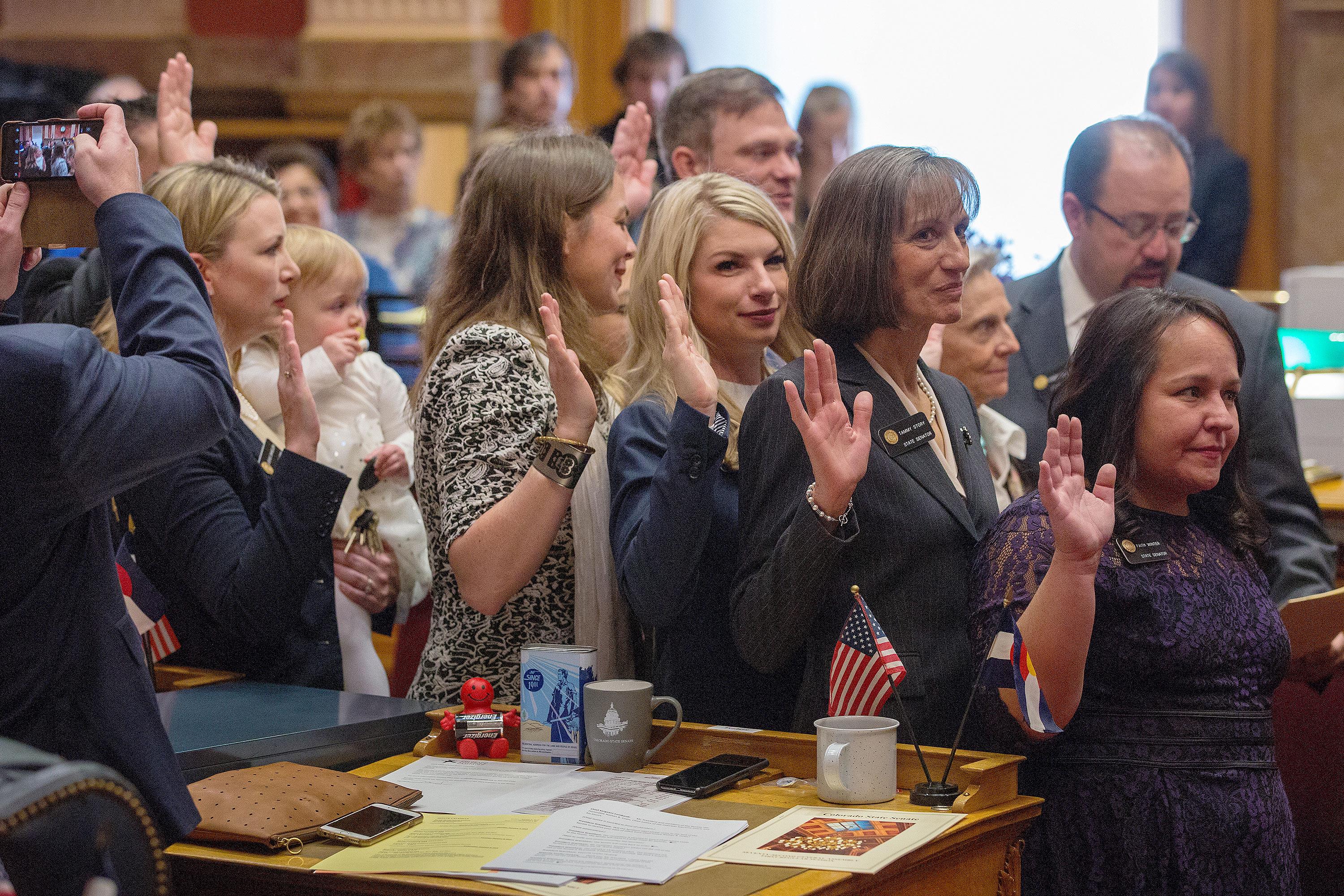
Colorado’s House of Representatives is in an exclusive club. It’s one of only two legislative chambers in the country where female lawmakers hold a majority. Overall, women make up nearly half of the state’s 100 lawmakers.
The growing involvement of women in politics is often credited to a backlash against President Donald Trump — but the trend started much earlier here.
In 1894, Colorado elected the nation’s first female state lawmakers in three Republican women. However, these days the gender gains mostly happen on the other side of the aisle.
When Democratic Rep. Meg Froelich was sworn in to fill a vacancy left by a male colleague who moved to the Senate earlier this month, she helped cement the chamber’s new female majority 34 to 31 — 26 of those women are Democrats. Overall, the Democratic majority is 41 to 24.
Both statehouse chambers and the governorship were swept by the midterm blue wave. The gender balance of the Senate leans male.
A total of 286 women have served in the General Assembly in contrast to 3,081 men, going back to when Colorado was a territory, according to figures from the Legislative Council. Statehood was ratified in August of 1876. Most of the gains for women in the legislature have come in modern times and in recent years groups like Emerge Colorado have played a role. The local affiliate is part of a national organization working across half of the states in the U.S. Emerge recruits and trains Democratic women to run for office.
“The bump we’ve seen in Congress and state legislators this year is really about voters responding to powerful, smart, thoughtful women who are running,” said Emerge Colorado Executive Director Michal Rosenoer. “And we’ve got those women running right now because we’ve been investing in women candidates for a decade or more now.”
Last November, Emerge candidates won 15 out of 16 state races, she said. Recently, Emerge has had to turn away applicants to participate in its training program, Rosenoer said. Historically, the tricky part has been convincing women to run in the first place.

“Women tend to need to be invited or asked to run five to seven times,” she said. “Whereas, I think, if you’re a man, you wake up and put your tie on in the morning and you think to yourself, ‘hey, I kind of look like the president.’”
Newly elected Democratic Rep. Serena Gonzales-Gutierrez of Denver participated in Emerge Colorado’s six month training. When she told people she was considering elected office they would say, “‘Well, don’t you have small children?’ — as if to discourage me.”
“That made me want to fight more,” Gonzales-Gutierrez said. “That’s all the reason that I am doing this.”
These local and state elections are seen as pipelines for women to move to higher office. Other national groups like VoteRunLead aren’t restricted to only the left side of the aisle and train GOP women, too. Their candidates are encouraged to “run as you are” and they expect to train 30,000 more women by 2020.
Their website states “women have the talents to achieve their political ambition and to be unapologetic about it.” At the moment, Republicans lack a targeted recruitment and training effort for female candidates in their party.
“I think everyone brings a different style and approach. It doesn’t matter about their gender or race. Everybody is different,” said Republican Sen. Vicki Marble of Fort Collins.
After the November election she became the only woman in her Senate caucus. Republicans lost a net of two female lawmakers in the last election. That doesn’t worry her though. Marble said her party has plenty of great female candidates, and she credits the tough midterm environment for sweeping more progressives into office.
Twelve of the Senate’s 19 Democrats are women, including five whose races were pivotal to Democratic control of the chamber.
For Marble, individual experiences are what’s most important, regardless of gender.
“There’s a lot of qualified people here who have been in business and I’ll tell you what, no training program I think could give you the insight that they have,” she said.

Others in the GOP would like their party to do more to encourage female candidates. Having more women in power can change what policies get debated, and how business is conducted. “Women legislate a little differently than men,” said Rep. Lois Landgraf, a Republican from Fountain. She also opines that a training program could help women do a better job of supporting each other once they’re in office.
“We’re harder on ourselves and we’re harder on our women legislators, or if you’re in the job market,” she said, “women are not always as kind to other women as they perhaps could be.”
Alumni of the training groups rely on each other for advice and often become good friends. Colorado’s last legislative session was clouded by a number of credible sexual harassment allegations against a handful of lawmakers — including a historic vote to expel one of them. For some women under the gold dome, the strained situation brought a sense of comradery.
The gains have been steady outside of the campaign trail as well. This legislative session, for the third time in a row, the House elected a female Speaker in KC Becker. Women head the legislature’s nonpartisan agencies, and the Senate and House staff. In another sign of the times, the capitol’s first ever private lactation room for new mothers will soon be up and running.









